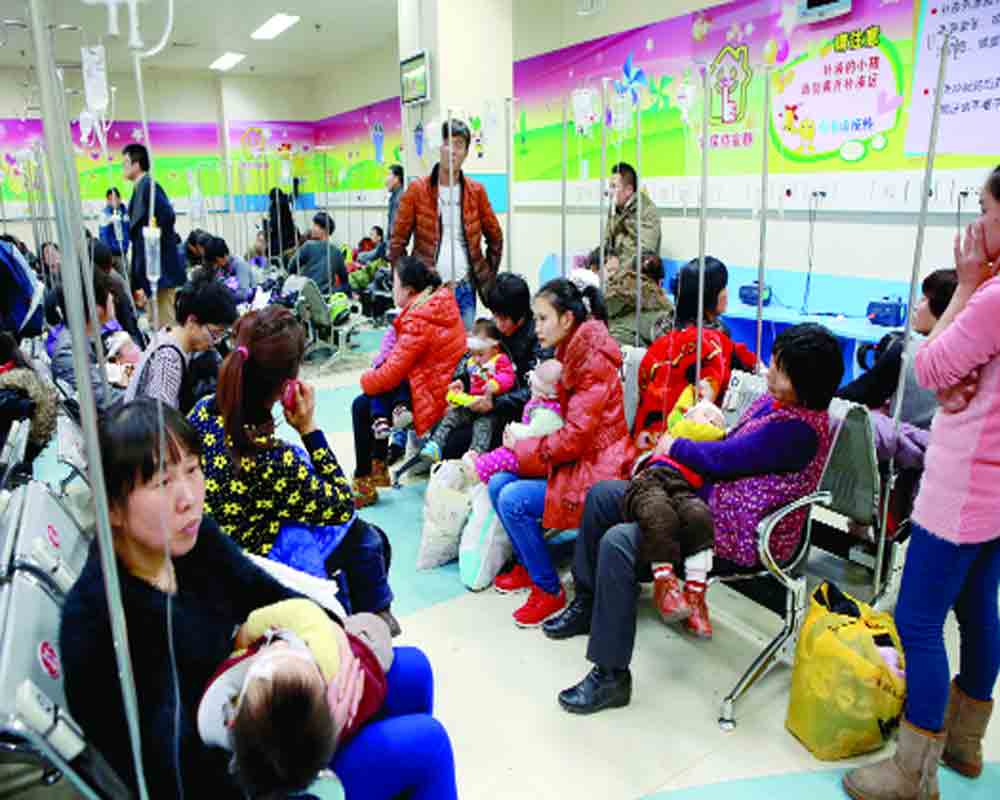In the wake of a surge in a mysterious respiratory illness in neighbouring China, India is closely monitoring the situation. On Sunday, the Union Health Ministry issued a critical alert to all States, urging an immediate reassessment of public health preparedness. This includes a thorough evaluation of essential resources such as bed availability, influenza medications, vaccines, medical oxygen, antibiotics, personal protective equipment, testing kits, and reagents.
Additionally, States are advised to ensure the optimal functioning of oxygen plants and ventilators, as well as the implementation of stringent infection control practices. The nation remains vigilant as it braces itself for potential challenges posed by the evolving health crisis.
At the same time, in an effort to allay fears among the public, the advisory stated that the Ministry is closely monitoring the situation in the neighbouring country and emphasised there is no need for panic.
This follows an undetermined pneumonia outbreak in China that is severely affecting children, as media reports describe overwhelmed children’s hospitals in multiple locations. The Health Ministry’s decision is an important measure, considering the ongoing winter when influenza-spreading viruses are most active in infecting children. The deteriorating air quality in many metros like Delhi and Mumbai is already taking a toll on children’s health, with many suffering from respiratory illnesses, according to pediatricians.
The Ministry said it has decided to proactively review preparatory measures against respiratory illnesses as a matter of abundant caution. “This decision is noted to be important in view of the ongoing influenza and winter season, which results in an increase in respiratory illness cases. The Government is closely monitoring the situation and has indicated that there is no need for any alarm,” it said.
In a letter to all States and Union Territories, the Union Health Secretary, Sudanshu Pant, advised them to immediately review public health and hospital preparedness. This includes assessing the availability of beds, drugs, and vaccines for influenza, as well as medical oxygen, antibiotics, personal protective equipment, testing kits, and reagents. The review should also cover the functionality of oxygen plants and ventilators, along with infection control practices.
The State authorities have been advised to implement the Operational Guidelines for Revised Surveillance Strategy in the context of COVID-19, which were shared earlier this year. These guidelines provide for integrated surveillance of respiratory pathogens presenting as cases of influenza-like illness (ILI) and severe acute respiratory illness (SARI).
They have also been instructed to ensure that the trends of ILI and SARI, particularly among children and adolescents, are closely monitored by the district and State surveillance units of the Integrated Disease Surveillance Project (IDSP). The data for ILI/SARI is required to be uploaded on the IDSP-Integrated Health Information Platform portal. State authorities have been directed to send nasal and throat swab samples of patients with SARI, especially children and adolescents, to the Virus Research and Diagnostic Laboratories for testing for respiratory pathogens.
The cumulative effect of implementing these precautionary and proactive collaborative measures is expected to counter any potential situations and ensure the safety and well-being of citizens.
Recently, information shared by the WHO has indicated an increase in respiratory illness in the northern parts of China. This is predominantly attributed to usual causes such as influenza, mycoplasma pneumonia, and SARS-CoV-2.
According to the WHO, the release of Covid-19 restrictions coinciding with the onset of the winter season, in addition to cyclical trends of respiratory illnesses such as mycoplasma pneumonia, has led to this surge.
“Superspreader events, such as weddings, appear to have driven the resurgence of Covid-19 in India. This time, there are also many activities due to the large number of weddings this season coupled with religious events. People usually become careless. So, we hope that they do not lower their guards and adopt safety measures,” said an official from the Ministry of Health.
Health experts have called for hygiene measures such as washing hands, ensuring that kids cover their nose and mouth while sneezing and coughing, moving away from others, and using tissues to do so. Use and discard these tissues safely. Wearing masks in social situations should be encouraged, they said.
























